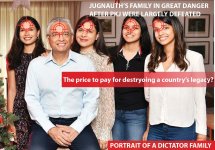Must the People of Mauritius Take Over Their Rights to Overthrow a Dictator? Lessons from History and the Syrian Crisis
The question of whether citizens have the moral and legal right to take drastic measures against a dictator who terrorizes their nation is not new. It echoes through history and finds parallels in modern examples like Syria. This article examines this critical issue through the lens of democratic principles, historical lessons, and the particularities of Mauritius' situation.

Dictatorship: A Betrayal of the People
Dictators rise by consolidating power, often undermining the very democratic principles that uphold justice and equality. When such a regime stays in power for nearly a decade, as alleged in the hypothetical case of Mauritius, it inflicts deep wounds on the nation. The suppression of dissent, manipulation of resources, and fostering of a climate of fear can break the social fabric.The rights to life, liberty, and security are fundamental, as recognized by the Universal Declaration of Human Rights. When a leader systematically violates these rights, the question arises: What recourse do the people have?
Lessons from the Syrian Crisis
The Syrian civil war offers stark lessons. Under Bashar al-Assad, widespread repression and violence led to uprisings that spiraled into a devastating conflict. As dissent grew, Assad’s government responded with extreme measures, igniting a civil war that displaced millions and left the nation in ruins.Assad himself, under immense international and domestic pressure, reportedly fled at times to escape accountability. His leadership became synonymous with terror for many Syrians. This situation showcases how unchecked power and a lack of accountability can lead to national collapse.
However, the Syrian experience also demonstrates the consequences of poorly coordinated resistance. The fragmentation of opposition forces and the involvement of external powers prolonged the suffering.
The Mauritian Context
Mauritius, often lauded for its democratic traditions, has managed to avoid the scale of conflict seen in Syria. However, if a dictator were to emerge and oppress the nation, it would challenge the very foundation of its governance.The people of Mauritius, like any sovereign population, have the right to demand accountability and justice. Democratic mechanisms, such as elections, protests, and civil disobedience, are the first line of defense. When these fail, international pressure and legal avenues, like the International Criminal Court (ICC), should be explored.
The Moral Dilemma: Assassination vs. Justice
The idea of assassinating a dictator is controversial. Historically, figures like Adolf Hitler and Joseph Stalin have been subjects of assassination plots, which some argue could have saved millions of lives. However, assassination raises ethical questions and risks perpetuating cycles of violence.The alternative—bringing the dictator to justice through legal means—ensures accountability without undermining the rule of law. For Mauritius, a peaceful approach that strengthens institutions and democratic values is crucial to avoid long-term instability.
Empowering the People
For Mauritians, the focus should be on reclaiming rights through unity, vigilance, and nonviolent resistance. The lessons of history remind us that the fall of a dictator is only the beginning. Rebuilding trust, governance, and national identity requires sustained effort and cooperation.In case if the people of Mauritius does not get justice, or if Pinokio flees the country, must we kill his wife and daughters instead?
Targeting anyone’s family members, including the daughters of a political leader, is both morally and legally unacceptable. International law, human rights principles, and the rule of law strongly condemn such actions. Holding someone accountable for their actions does not extend to punishing their relatives, especially if they have no involvement in the leader's alleged wrongdoing.
Why Innocents Should Never Be Targeted
- Violation of Human Rights
The deliberate targeting of innocents is a direct violation of basic human rights, including the right to life and security. The sins of an individual cannot and should not be attributed to their family members or associates. - Erosion of Moral High Ground
When fighting against perceived tyranny, actions must be rooted in justice and morality. Attacking innocent family members only mirrors the oppressive tactics often associated with dictatorships, undermining the legitimacy of those opposing the regime. - International Legal Standards
Acts of violence against non-combatants, including family members of political leaders, are considered war crimes and crimes against humanity under international law. Such actions would open the door for legal prosecution of those involved. - Practical and Ethical Implications
Resorting to violence against family members can create a cycle of vengeance, destabilizing society further and harming efforts to establish peace and democracy.
The Right Approach
If a leader like PKJ were to flee, efforts should focus on:- Legal Pursuit: Leveraging international law to extradite and try the individual for their actions.
- Institutional Reforms: Strengthening governance systems to prevent future abuse of power.
- Accountability: Ensuring justice is served through fair and transparent mechanisms.
Please note that Pravin Kumar Jugnauth (Pinocchio) was also implicated in the execution of the murder of Kistnen, an innocent man whose wife has been denied justice for years.
The question remains: Should we uphold the laws or challenge them if justice continues to elude the people of Mauritius? Only time will reveal the answer.
While the notion of taking drastic measures against a dictator may arise in extreme situations, history teaches us that justice, not revenge, should be the ultimate goal. The people of Mauritius, if faced with such a challenge, must prioritize unity, legality, and democratic principles to ensure a brighter future. The Syrian experience serves as both a warning and a guide—reminding us that while the fight for freedom is just, the means must align with the vision of a peaceful and prosperous nation.
Last edited:

